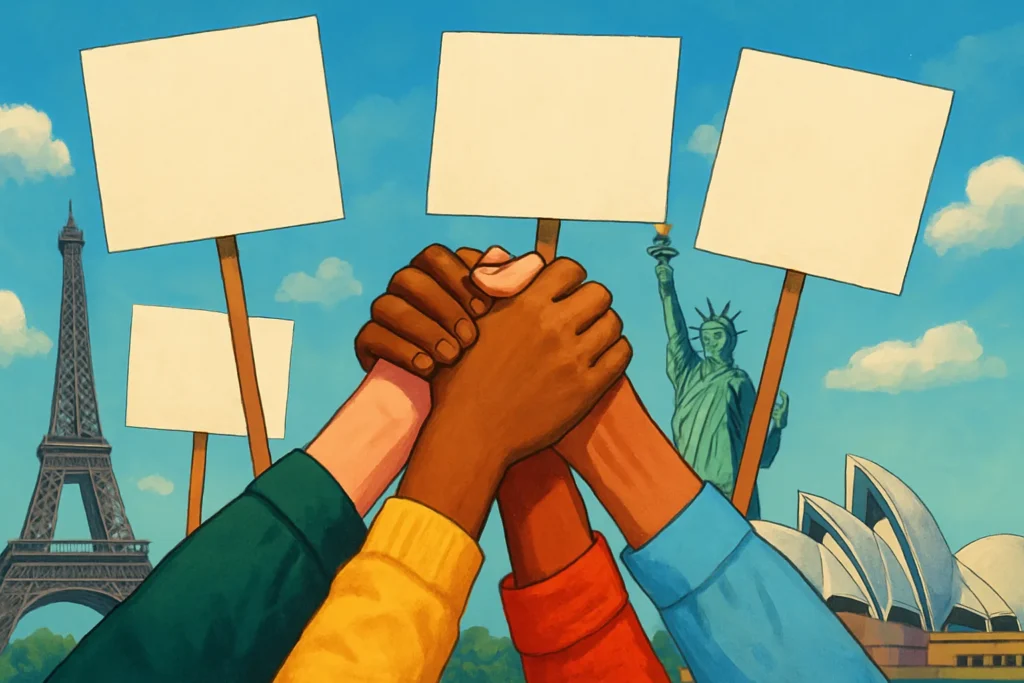Protest on Main Street: From Dalton to the World
The steady hum of Dalton, Georgia’s textile mills—long driven by the labor of immigrant families—met an abrupt change last weekend as hundreds of demonstrators poured into Walnut and Thornton avenues. Car horns blared to signal solidarity while flags of both the United States and Mexico fluttered along the route. This scene, repeated in cities from Arlington, Texas to Los Angeles and echoed by marches in Canada, Mexico, Colombia, and across Europe, marked an unmistakable turning point: immigration protests have become both hyper-local and undeniably global.
Under the banner of “No Kings Day,” protesters resisted what many view as President Trump’s emboldened authoritarian streak and hardline stance on immigration. In Dalton—a city the U.S. Census now lists as 53% Hispanic—organizers like Armida Vicente deftly used TikTok and Facebook to summon a crowd worried about escalating ICE raids. Residents, many of whom have woven their stories into the very fabric of the local economy, stood up not just for their personal freedoms, but for the principle that, as one sign read, “Immigrants are the backbone of America.”
In Arlington, Texas, chants of “Immigrants are welcome here” reverberated outside the Tarrant County Subcourthouse. The gathering topped 1,300 people, with Carol Rayburn of Progressive Women of Arlington emphasizing the growing unity against “tax breaks for billionaires and threats to Social Security”—policies she described as an affront to both economic equality and the American dream. The sentiment was echoed by retired Army combat medic Patti Coggins, who pleaded for national unity, warning, “Let’s come together before we lose it all.”
Military Might versus Grassroots Power
Los Angeles became a flashpoint after ICE raids swept across familiar storefronts—Home Depots, 7-11s, even family-run doughnut shops—leaving more than a hundred families torn apart. President Trump’s response: deploying 2,000 National Guard troops under the guise of restoring order. Yet Governor Gavin Newsom quickly shot back, labeling the move “purposefully inflammatory,” and warning it risked escalating rather than soothing tensions.
This isn’t a new playbook. Historians point to similar tactics in the 1960s, when crackdowns on civil rights demonstrators by militarized police often served only to galvanize dissenters and elicit sympathy nationwide. In today’s media-rich environment, images of soldiers in city streets had the dual effect of intensifying the protest’s urgency and drawing in even broader support.
What happens when the might of the state meets the power of mass mobilization and global connectivity? One answer lies in the coalition of support that poured out online and on the ground. Celebrities—Sabrina Carpenter, Olivia Rodrigo, Gracie Abrams, Kendall Jenner, Jenna Ortega—took to social media to denounce “violent deportations” and amplify the message. Their reach transformed a regional outcry into a global rallying cry: between hashtags and livestreams, the “No Kings” movement leaped continents in a matter of hours.
“We’re not just fighting for immigrants—we’re fighting for America’s soul. Justice now, or justice delayed for all.”
Global resonance came swiftly and tangibly. Demonstrators locked down embassy zones from London to Bogotá, snarled transit in Paris, and altered the plans of countless travelers. In Milan, hoteliers reported same-day cancellations from American guests wary of being trapped near protest flashpoints. According to Sally Kol, an international tourism analyst based in Berlin, these disruptions reflect “just how interconnected activism, commerce, and governance have become—and how fragile global mobility is when basic rights are in question.”
Beyond Borders: A Movement Redefining Democracy
Why this scale, and why now? The rallying theme—No Kings, No Tyrants—cuts deeper than immigration alone. Across continents, there’s rising anxiety about creeping authoritarianism, the erosion of democratic norms, and growing wealth inequality. The Economist Intelligence Unit has cautioned for years that populist nationalism threatens liberal democracies on multiple fronts: undermining courts, marginalizing minorities, and normalizing the spectacle of rule by fiat rather than law.
The “No Kings” protests have crystallized these global fears, becoming a vessel for opposition to a grab bag of anti-progressive policies. Chilean sociologist Lucia Valdés observed in El País, “People are taking to the streets not just for the immigrant next door, but for the idea that government by the people should never devolve into government by decree.” That clarity explains why the movement resonated just as strongly in Lisbon and Stockholm as in Texas or Georgia. A closer look reveals another truth: such demonstrations have a track record of driving policy change, even when authorities initially appear intransigent. Consider the 2006 “Day Without Immigrants” walkouts or the global Women’s Marches—both spawned new legislation and cultural sea changes despite, or because of, sharp resistance from conservative leaders.
Today’s protests come at a moment when, according to a recent Pew Research Center survey, a record 75% of Americans support pathways to citizenship for undocumented immigrants. Grassroots pressure, when sustained, has the power to make government—democratic or otherwise—bend toward justice.
Yet danger persists. “The authoritarian temptation is always to criminalize dissent,” notes Harvard historian Lila Sanchez. “But mass movements, so long as they remain peaceful and strategic, put that tactic on trial in the court of world opinion.” Which raises the question: When a movement’s moral claim is so widely embraced, who is truly isolated—the protestors in the street, or the politicians barricaded behind security and bureaucracy?
As the world watches and participates—from manufacturing hubs in Georgia to embassy corridors in Berlin—one message rings out: the future will be shaped not by strongmen, but by the collective courage of those who refuse to be ruled by fear or decree.

